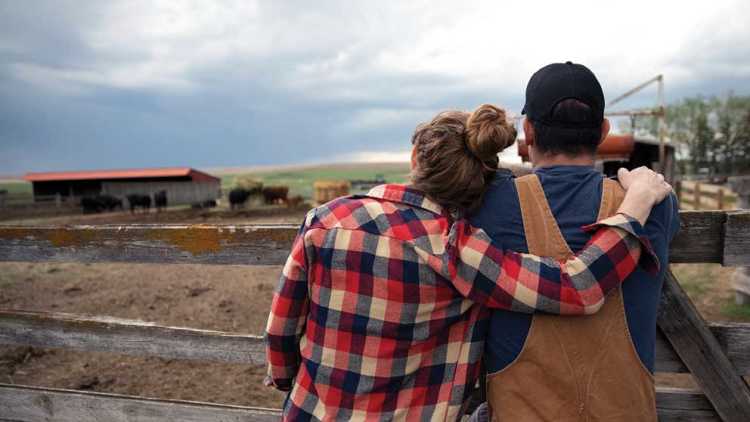Mental wellness is everybody’s business

Taking care of your mental health is a critical part of self-care – and it’s an important step in not only helping others address personal issues but supporting the farm business as well.
How mental health affects the farm
Feeling unwell can have real repercussions for how farm businesses perform, says Deborah Vanberkel, a Kingston, Ont., dairy farmer, registered psychotherapist, and owner of Cultivate Counselling Services.
“People can range from healthy normal functioning for them to mild or moderate issues. Moderate to severe is the red zone,” Vanberkel says.
The symptoms a person exhibits in that zone vary considerably. Common signs of mental strain include high anxiety, panic, racing thoughts and trouble sleeping, difficulty eating, irritability and lasting mood changes. Other behavioural changes could also include general restlessness, withdrawing from social engagement, changes in otherwise good routines (such as ceasing to exercise regularly), and task avoidance.
For Vanberkel, the latter point can be particularly problematic given the diversity of tasks required for farms to operate smoothly and efficiently. Many symptoms contribute to an inability to problem-solve.
“If a truck needs to make a delivery at an irregular time, and it stumps you, that might be an indicator. Even that small task that seems so easy to decide becomes huge and daunting,” Vanberkel says. “It’s hard on the person afterwards because they don’t know why such a simple thing was so overwhelming.”
Recognizing problems – and how they can be fixed
Farmers generally have many things on their mind at once, which can make it difficult — though by no means impossible — to gauge how they’re doing. It’s when decisions become difficult that Vanberkel says trouble can be easier to recognize.
Given the diversity of personalities, preferences and circumstances, remedying the situation starts with understanding what constitutes a healthy mental state for the person in question.
“Figure out what works best. Identifying a problem doesn’t mean you have to see a counsellor. It can mean self-care or access to different types of support,” Vanberkel says. She lists conversations with friends, attendance at religious services, or devoting even small amounts of time to leisure as options.
“Are you able to go for an ATV ride? Can you invite family over? You’re allowed to say you want to do things.”
There are also some overarching wellness strategies. According to FCC’s Rooted in Strength publication, these include regular exercise — particularly for those generally confined to the office or tractor cab for long periods — and remembering to assess how you’re feeling from time to time. Setting dividing lines between work and leisure (like not answering email while on holiday) and being disciplined about setting time aside to disconnect at the end of the day can also help.
Figuring out what works can take time, so Vanberkel believes practice is critical.
“How did you get good at your job? At your sport? You practised it. When you change a behaviour and thinking pattern you have to practise.”
Self-awareness helps support others
For Kim Hyndman-Moffat, crisis counsellor and facilitator for In the Know Mental Health Literacy Program, change in performance is one of the primary ways of recognizing someone might be suffering mental strain.
Help lines and other resources … can be valuable tools for those initiating a conversation.
“If you have someone who normally gives 110% but jobs are piling up, that’s an indicator,” she says. Other indicators include seeing the person less frequently, increases in physical issues like headaches and avoidance behaviours such as substance abuse or too much screen time.
As with diagnosing our own issues, self-awareness can help us recognize and assist others who might be struggling. An easy and effective way to broach the subject, according to Hyndman-Moffat, is simply asking how the person is really doing. “It’s important to listen and not feel like we have to weigh in with an opinion. Lend an ear and be a good support,” she says.
Vanberkel agrees. “You’re allowed to say, ‘I don’t know what to say right now.’ Be non-judgmental and listen to people,” she adds.
Support options vary. If you feel comfortable, engage in deeper conversation – but if you don’t, offering to help someone connect with resources is beneficial too.
Regardless of the delivery mechanism, help lines and other resources like the Do More Agriculture Foundation can be valuable tools for those initiating the conversation.
“Even if you’re the person who is not sure how to approach someone, you can call [help lines] and ask for advice,” Hyndman-Moffat says.
Stay realistic
While they know farm operations don’t pause for mental health challenges, Vanberkel and Hyndman-Moffat both believe making mental health a priority can make a difference in weathering wellness crises. According to Vanberkel, everyone involved needs to understand what mental health is, that definitions and support strategies differ, and that talking openly and often can be helpful all around.
“Make mental health a priority before getting to a crisis,” Hyndman-Moffat says. “When something does become a crisis, stay realistic. Find out what the person needs and what you can actually do.”
From an AgriSuccess article by Matt McIntosh.
How mental health impacts Canadian farms
The 2019 Mental Health and Farm Business Management study conducted by FCC and Farm Management Canada surveyed farmers across the country about their mental health challenges and triumphs, and how each impact their businesses.
Highlights regarding day-to-day business management:
Producers who have an optimistic mindset are more likely to regularly implement key business management practices, including a written business plan
88 per cent of producers who follow a written business plan report doing so contributes to their peace of mind
20 per cent of respondents take more time to make informed and timely business decisions when stressed
Highly optimistic producers are more likely to indicate positive behaviour when coping with stressful circumstances such as the general unpredictability of agriculture – itself identified as the top stress factor nationwide
To read the full report visit: www.fmc-gac.com/healthymindshealthyfarms/

Virtual conferences and events are a valuable, effective way to learn with a little preparation and a few adjustments.
